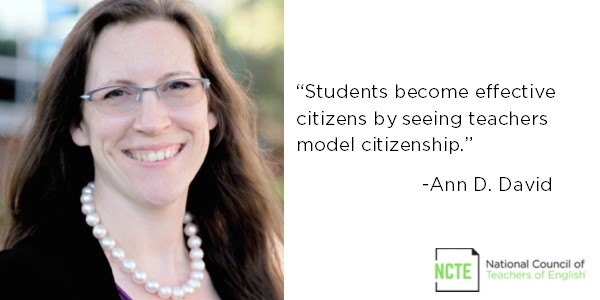This post is written by member Ann D. David.
April in Texas is a hard month for teachers. It has all the “regular” hard: end of the year, spring fever, long stretches without days off. But Texas also throws in a whole lot of standardized testing during April, and even into May. Teachers are tired. So when almost 100 of them show up on a cool (for Texas), misty Saturday morning for a Heart of Texas Writing Project workshop titled “Engaging with Social Issues in Our Literacy Classrooms,” you know they’re ready to work.
I presented a session titled “What Does Engaging in Politics Look Like for You?” This question is a loaded one in that, for teachers, there is always a push–from unseen forces–to be apolitical. While the political nature of teaching can be debated in another space, I chose to open the conversation with a quote from the Texas Educators’ Code of Ethics, the state law that outlines the ethics requirements for certified teachers in Texas.
“The Texas educator, in accepting a position of public trust, shall measure success by the progress of each student toward realization of his or her potential as an effective citizen. The Texas educator, in fulfilling responsibilities in the community, shall cooperate with parents and others to improve the public schools of the community.” (My emphasis.)
Seen though this lens, political engagement becomes necessary for teachers to fulfill the requirements of their job. Students become effective citizens by seeing teachers model citizenship. For example, one teacher in my session shared that she always encouraged the parents of her students to vote as Election Day neared.
Teachers engaging with the processes that create education policy at local, state, and national levels improve public schools. Another participant shared what she did when social media was lighting up about House Resolution 610, which purports to dismantle the Elementary and Secondary Education Act/Every Student Succeeds Act. First she went to read the bill itself to decide whether what was being said online was true. Then–and here is her advocacy–she shared with her students her process of reading something on social media and doing research.
For some teachers, political engagement means continuing to teach 1984, as they have for the past fifteen years, even though the text is far more politically charged than it was six months ago. Or to keep the Holocaust unit, even when parents question its relevance. Engaging politically, then, is not only political protesting or political campaigning. A significant part of my session was to have these conversations and to realize all the important and necessary political work that participants were already doing in their classrooms. If you are looking to expand how your students can grow into engaged citizens, you can select mentor texts that feature a diverse range of characters, or that take up the challenges facing our nation today, including gender equality, poverty, and climate change.
As we wrapped up the workshop, I acknowledged to the teachers there that I have been engaged politically for a long time. I come from a small town, and my parents modeled for me what it meant to be engaged in the community by serving on municipal boards or running for office. As a second year teacher, I spoke out against the layoffs in my district at the school board meeting. In addition, I have lobbied in Washington, DC, with the National Writing Project’s Spring Meeting. This list represents the bigger issues I have engaged in; I also regularly contact my local, state, and national elected officials and regularly attend my local school board meetings–both of which teachers can do starting now.
However, many teachers in the session admitted to being very new to the idea of political engagement and advocacy. A fitting closing, then, was to share with them that NCTE Advocacy Day was Thursday, April 27. We ended the workshop by looking at the website for Advocacy Day and exploring Everyday Advocacy as well. The teachers turned and talked with colleagues, committing to their Thursday action. As the workshop ended, no one was dragging–even though it was 1:00 p.m. and past time for lunch. Teachers were energized, focused, and ready to take action. I hope everyone reading this post will be too.
Dr. Ann D. David is an assistant professor of education at the University of the Incarnate Word and a teacher-consultant of the San Antonio Writing Project. She has been a writer since before memory and currently blogs at anndavid.org.
For more information on NCTE Advocacy, please visit NCTE’s Take Action page.

